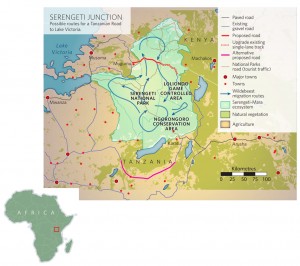by Mark Gillies
The Loliondo Land Issue
In April the ongoing issue of land use in the Loliondo Division on the borders of the Serengeti National Park came to the fore once more as headlines declared ‘The End of the Maasai’ (Survival International 28 March 2013). This is an emotive issue that combines the themes of the rights of indigenous people, environmental conservation, historical grievances, a perceived uncaring central government (with worse implied), and foreign hunters [see also TA 95,97,105].
The current issue dates back to 1992, when an Emirati hunting company, the Ortello Business Corporation (OBC), owned by the businessman and member of the Dubai royal family Mohammed Abdulrahim Al-Ali, secured the rights to a hunting concession in Loliondo Division of Ngorongoro. However the problem can only be understood in the general context of land use and the displacement of peoples.
According to the house blog of Just Conservation, an online forum for academics and activists interested in equitable conservation, the 1992 allocation was done with a lack of procedural clarity and without consulting the relevant community representatives. As the 1990s progressed, there were accusations of dubious hunting practices, including the export of live animals, although these have not been verified or recently investigated. (http://www.justconservation.org/grabbing-land-forconservation-in-loliondo,-tanzania)
In 2009, the severe drought experienced in northern Tanzania led to conflict between OBC and the local Maasai communities as the herders endeavoured to water their livestock in an area where access was prohibited by OBC. In the ensuing conflict, a Police Field Force unit restored order with a level of force that resulted in the burning of several homesteads and accusations of physical and sexual abuse. OBC defended their position by stating that herders are only denied access to the water sources during the hunting season. This runs from July to September, which unfortunately coincides with the dry season.
So, when in March this year it was announced by the government that a 1,500 square kilometre ‘wildlife corridor’ would be created in the Loliondo that would displace an estimated 30,000 people and affect
Tourism & Environmental Conservation thousands more who use the grasslands for seasonal grazing, the local communities engaged in vociferous protest.
The story has interesting local – and national – political implications. In addition to the 2012 threat to blockade the Ngorongoro Crater (The East African 8 December 2012), one protest took the form of a mass burning of CCM membership cards by Maasai women. This move caught the attention of local CCM officials who, according a BBC report, made the long drive to Loliondo from Arusha to denounce the proposed corridor.
The affected communities plan to lodge a legal challenge, but as a previous action from 2009 remains unheard, they are not hopeful. However, on 29 June, Prime Minister Pinda told the National Assembly that the Government had “received complaints from various stakeholders and the people of Loliondo” and would therefore review its most recent decisions regarding the Loliondo land concessions and OBC. (Daily News and http://allafrica.com/stories/201307010357.html).
Serengeti Highway proposal remains live
On 27 June word emerged that the proposed Serengeti Highway, which has provoked international condemnation [see TA 97/99], may nevertheless still be a viable project in the eyes of the Tanzanian government. The proposed budget for the financial year 2013/14 appears to contain an allocation of funds to advance the planning and design of the highway. This is despite the reported offer by the German government and the World Bank to finance the construction of an alternate southern route that will protect the Serengeti ecosystem and arguably reach more people than the original proposed northern route. The southern route would, however, not suit the interests of mining and soda ash extraction interests operating in the northern areas. (27 June Wolfganghthome’s Blog)
Tourism taxation
On 1 July the new Tourism Development Levy came into force. The levy imposes a 2% bed night charge on all tourist accommodation. Of even more concern was the proposal to make tourism products and services liable to VAT at 18%. This move had been adopted by Uganda but rejected by Kenya. Fortunately, on 28 June the Tanzanian Assembly also rejected the imposition of the tax, which in one move would have made Tanzania a far more expensive destination (in general) than Kenya – a dangerous move.
Edward VIII: The Lion King
And finally, on 28 May in the UK, a documentary aired on Channel Four entitled ‘Edward VIII: The Lion King’. The programme was a fascinating account of the transition of Edward VIII, in his time as Prince of Wales, from hunter to one of the earliest advocates of African conservation. Working with the famous Denys Finch Hatton, after developing an understanding of the bloody reality of the growing hunting trend, the Prince used his celebrity to draw attention to the increasing threat to the wildlife and integrity of what we now call the Serengeti ecosystem. Which just goes to show that some issues have an enduring importance beyond their local significance.

